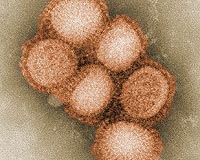| . |  |
. |
Pittsburgh PA (SPX) Jan 06, 2010 Closing schools for less than two weeks during a flu pandemic may increase infection rates and prolong an epidemic, say University of Pittsburgh researchers in a study published ahead-of-print and online in the Journal of Public Health Management and Practice. The findings, developed from a series of computer simulations based on U.S. census data, indicate that schools may need to be closed for at least eight weeks in order to significantly decrease the spread of infection. The value of school closures has been debated as a possible strategy to stem or slow the current H1N1 influenza pandemic. Indeed, hundreds of schools across the country have been closed at different periods during 2009 for fear the virus would spread more quickly if they stayed open. "Although closing schools may seem like a reasonable way to slow the spread of flu, we found that it was not effective unless sustained for at least eight weeks after implementation," said study lead author, Bruce Lee, M.D., M.B.A., assistant professor or medicine, epidemiology and biomedical informatics, University of Pittsburgh. Closing schools quickly at the start of an outbreak was much less important than keeping them closed continually throughout the epidemic, he added. According to study authors, short-duration school closures can increase transmission rates by returning susceptible students back to school in the middle of an epidemic when they are most vulnerable to infection. The study also found that identifying sick students individually and keeping them from attending school had minimal impact on an epidemic. In addition, there were no significant differences between individual school closures and system-wide closures in mitigating an epidemic. The study was based on an agent-based computer simulation model of Allegheny County, Pa., that represented the county's population, school systems, workplaces, households and communities. Simulations were based on the movement of residents each weekday from their households to designated workplaces or schools, and included 1.2 million people - 200,000 of whom were school aged children. The study also included more than 500,000 households and nearly 300 schools. Co-authors of the study include Shawn T. Brown, Ph.D., Pittsburgh Supercomputing Center; Philip Cooley, M.S., William Wheaton, M.A., and Diane Wagener, Ph.D., RTI International; Ronald Voorhees, M.D., M.P.H., Allegheny County Health Department; and Maggie Potter, J.D., Samuel Stebbins, M.D., M. P.H., John Grefenstette, Ph.D., Shanta Zimmer, M.D., Richard Zimmerman, M.D., M.P.H., Tina-Marie Assi, M.P.H., Rachel Bailey, M.P.H., and Donald S. Burke, M.D., University of Pittsburgh.
Share This Article With Planet Earth
Related Links University of Pittsburgh Schools of the Health Sciences Epidemics on Earth - Bird Flu, HIV/AIDS, Ebola
 France cancels half flu vaccine orders
France cancels half flu vaccine ordersParis (AFP) Jan 5, 2010 France cancelled purchases of 50 million swine flu vaccines after ordering far more than needed, but was confident on Tuesday that it would not have to compensate the big companies that provide them. Health Minister Roselyne Bachelot said France was cancelling 50 million of the 94 million doses ordered from companies including Sanofi-Pasteur and GlaxoSmithKline, amid criticism of the governm ... read more |
|
| The content herein, unless otherwise known to be public domain, are Copyright 1995-2009 - SpaceDaily. AFP and UPI Wire Stories are copyright Agence France-Presse and United Press International. ESA Portal Reports are copyright European Space Agency. All NASA sourced material is public domain. Additional copyrights may apply in whole or part to other bona fide parties. Advertising does not imply endorsement,agreement or approval of any opinions, statements or information provided by SpaceDaily on any Web page published or hosted by SpaceDaily. Privacy Statement |